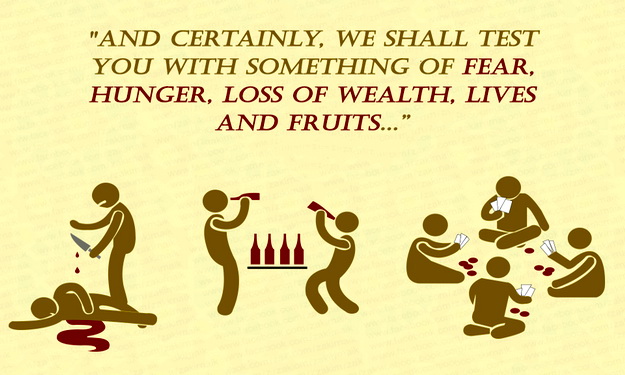Allaah Subhanahu ta’ala says in the Quran:
“And certainly, We shall test you with something of fear, hunger, loss of wealth, lives and fruits, but give glad tidings to As-Sabirin (the patient). Who, when afflicted with calamity, say: “Truly, to Allaah we belong and truly, to Him we shall return.” They are those on whom are the Salawat (i.e., who are blessed and will be forgiven) from their Lord, and (they are those who) receive His mercy, and it is they who are the guided ones.” [Quran, Surah al-Baqarah, 2:155-157]
The Believer is Patient with the Affliction and thus gains a Reward
Allaah informs us that He tests and tries His servants, just as He said in another Ayah:
“And surely, We shall try you till We test those who strive hard (for the cause of Allaah) and As-Sabirin (the patient), and We shall test your facts (i.e., the one who is a liar, and the one who is truthful).” [Quran, 47:31]
Hence, He tests them with the bounty sometimes and sometimes with the afflictions of fear and hunger. Allaah said in another Ayah:
“So Allaah made it taste extreme of hunger (famine) and fear.” [Quran, 16:112]
The frightened and the hungry persons show the effects of the affliction outwardly and this is why Allaah has used here the word ‘Libas’ (cover or clothes) of fear and hunger. In the Ayat above, Allaah used the words:
“with something of fear, hunger,” meaning, a little of each. Then (Allaah said),
“loss of wealth,” meaning, some of the wealth will be destroyed,
“lives” meaning, losing friends, relatives and loved ones to death,
“and fruits,” meaning, the gardens and the farms will not produce the usual or expected amounts. This is why Allaah said next:
“but give glad tidings to As-Sabirin (the patient).”
He then explained whom He meant by ‘the patient’ whom He praised:
“Who, when afflicted with calamity, say: “Truly, to Allaah we belong and truly, to Him we shall return.”” meaning, those who recite this statement to comfort themselves in the face of their loss, know that they belong to Allaah and that He does what He wills with His servants. They also know that nothing and no deed, even if it was the weight of an atom, will be lost with Allaah on the Day of Resurrection. These facts thus compel them to admit that they are Allaah’s servants and that their return will be to Him in the Hereafter.
This is why Allaah said:
“They are those on whom are the Salawat (i.e., who are blessed and will be forgiven) from their Lord, and (they are those who) receive His mercy,” meaning, Allaah’s praise and mercy will be with them. Sa’id bin Jubayr added, “Meaning, safety from the torment.”
“and it is they who are the guided ones.” ‘Umar bin Al-Khattab commented: “What righteous things, and what a great heights.”
“They are those on whom are the Salawat from their Lord, and (they are those who) receive His mercy” are the two righteous things.
“and it is they who are the guided ones” are the heights.
The heights means more rewards, and these people will be awarded their rewards and more.
The Virtue of asserting that We all belong to Allaah, during Afflictions
There are several Ahadith that mention the rewards of admitting that the return is to Allaah by saying:
“”Truly, to Allaah we belong and truly, to Him we shall return.”” when afflictions strike. For instance, Imam Ahmad reported that Umm Salamah narrated:
Once, Abu Salamah came back after he was with Allaah’s Messenger and said: I heard Allaah’s Messenger recite a statement that made me delighted. He said:
“No Muslim is struck with an affliction and then says Istirja’ when the affliction strikes, and then says: ‘O Allaah! Reward me for my loss and give me what is better than it,’ but Allaah will do just that.” Umm Salamah said: So I memorized these words. When Abu Salamah died I said Istirja’ and said: “O Allaah! Compensate me for my loss and give me what is better than it.” I then thought about it and said, “Who is better than Abu Salamah” When my ‘Iddah (the period of time before the widow or divorced woman can remarry) finished, Allaah’s Messenger asked for permission to see me while I was dyeing a skin that I had. I washed my hands, gave him permission to enter and handed him a pillow, and he sat on it. He then asked me for marriage and when he finished his speech, I said, “O Messenger of Allaah! It is not because I do not want you, but I am very jealous and I fear that you might experience some wrong mannerism from me for which Allaah would punish me. I am old and have children.” He said:
“As for the jealousy that you mentioned, Allaah the Exalted will remove it from you. As for your being old as you mentioned, I have suffered what you have suffered. And for your having children, they are my children too.” She said, “I have surrendered to Allaah’s Messenger.” Allaah’s Messenger married her and Umm Salamah said later, “Allaah compensated me with who is better than Abu Salamah: Allaah’s Messenger.” [Muslim reported a shorter version of this Hadith.]
“And certainly, We shall test you with something of fear, hunger, loss of wealth, lives and fruits, but give glad tidings to As-Sabirin (the patient ones, etc.).” [Quran, 2:155]
The Five tests and today’s situation
Fear (panic)
Shaikh Ibn al-‘Uthaymeen (rahimahullah) said:
“It is inclusive of all types of fear, general and specific. General: fear of enemy threatening the country; Specific: When an individual is tested with things which scares him and causes him to panic.”
Fear plays such an important role in everyone’s life that it paralyzes a person even before the actual calamity strikes – fear of hunger, fear of poverty, fear of losing wealth, fear of failing in exams, fear of death, fear of losing someone or something, and the list goes on – no wonder that the first thing Allaah mentioned with which He Subhanahu ta’ala will test us is FEAR.
Hunger
Shaikh Ibn al-‘Uthaymeen said:
“When the stomach is empty while having the extreme desire to eat, and it is the opposite of being fed till satisfaction. It is caused due to the following reasons. First: Scarcity of food; Second: lack of wealth or money to buy food; Third: being afflicted with a disease which prevents the person from eating food.”
Even with so much technological advancement, new farming methods, and good storage facilities and transportation, we still could not cope with famine and drought when it strikes a place or a nation. Example: the ongoing famine in Somalia.
We may have the entire world’s wealth, but might die out of hunger. We may control the entire world’s water, but might die out of thirst. This is to prove that sustenance is in Allaah’s control and He Subhanahu ta’ala has decreed for each and every one of us, our share of sustenance, even before we were born.
Loss of Wealth
Shaikh Ibn al-‘Uthaymeen said:
“It includes everything which a man possesses in the form of money, property, vehicles etc.”
It would also include job loss, unemployment, slacking businesses, slow economy, financial crisis, recession, cash crunch, devaluation of currency and property, economic bubble burst, stock market crashing. During the worldwide recession between 2008 and 2010, many people who lost their jobs fled Dubai and abandoned their cars at the Dubai airport in order to flee from being jailed because of debts.
Another example is the overnight demonetization of the Indian currency which was a severe blow to its people – their money became worthless, and millionaires became beggars for that instant in time.
(Loss of) Lives
Shaikh Ibn al-‘Uthaymeen said:
“This refers to deadly diseases which cause nations to perish like plague and other than that.”
Shaikh al-Sa’dee (rahimahullah) said: “It means: departure (death) of the loved ones either the children or some relatives or friends, or the different types of illnesses a person himself suffers or which his loved ones go through.”
(Loss of) Fruits
Shaikh Ibn al-‘Uthaymeen said:
“This refers to what is produced from the trees such as the date palms, the grape vines etc.; and that it is affected by a catastrophe which reduces the yield or ruins it (completely).”
Shaikh al-Sa’dee said: “Fruits, meaning: grains and produce from the date palms and other trees (including vegetables and fruits), which are destroyed either through (extreme) cold, hailstones, fire, or some other calamity from the sky like locust or other insects (destroying the crops).”
Other ways the crops and yields are affected are:
1. It does not rain which leads to drought and famine,
2. or it rains on barren land so the earth does not produce any vegetation,
3. or it rains a lot which causes flooding, and destroys lives and properties and vegetation,
4. or the water becomes bitter or contaminated and not good for consumption or irrigation.
Allaah says in the Quran:
“He it is Who sends down water (rain) from the sky; from it you drink and from it (grows) the vegetation on which you send your cattle to pasture; With it He causes to grow for you the crops, the olives, the date-palms, the grapes, and every kind of fruit. Verily! In this is indeed an evident proof and a manifest sign for people who give thought.” [Quran, 16:10-11]
“Tell Me! The water that you drink. Is it you who cause it from the rainclouds to come down, or are We the Causer of it to come down? If We willed, We verily could make it salt (and undrinkable), why then do you not give thanks (to Allah)?” [Quran, 56:68-70]
May Allaah ease our burden, forgive our sins, give us patience during the times of trials and guide us out the misery we suffer.
Source:
1. Tafsir Ibn Kathir
2. The statement of Shaikh Ibn al-‘Uthaymeen is paraphrased from his Tafseer of Surah al-Baqarah
3. Addition of text for the current situation.
 navedz.com a muslim's Quest for the truth
navedz.com a muslim's Quest for the truth







